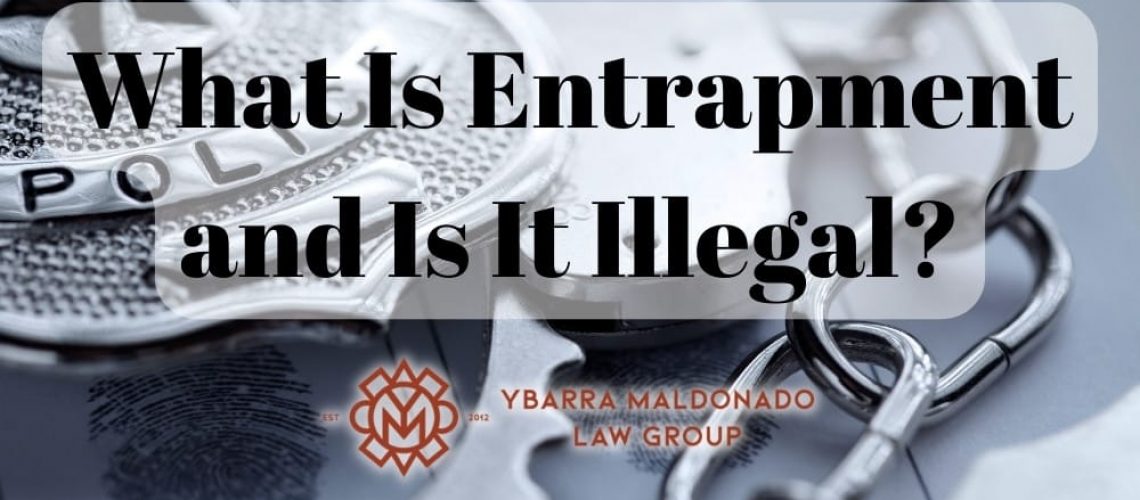Table of Contents
In any Phoenix criminal defense case, there are a number of defense strategies that your attorney might utilize. Affirmative defense involves presenting evidence that negates any criminal liability, even if you technically did commit crimes. There are several forms of affirmative defense, including self-defense, insanity, necessity, and entrapment. An entrapment defense is very strong as long as you can prove the credibility of your evidence.
Law enforcement officers are not legally allowed to entrap someone into committing a criminal act. However, that doesn’t stop it from happening. If you were accused of a crime that you would not have committed had you not been entrapped by police officers, you might be able to have your case dismissed outright. The Phoenix criminal defense lawyers at Ybarra Maldonado Law Group are here to offer their years of defense experience. We have seen great success in defending normally law-abiding people against the accusations of law enforcement agents. To schedule a consultation with us, please call 602-910-4040 today.
 Successful and valid entrapment defenses require two crucial elements. The first element is the actions of law enforcement officers that induced the defendant to commit a crime. In other words, they felt they had no choice but to commit the crime. The second element is the defendant’s lack of an existing predisposition to commit a crime. They would not have committed the crime if not for the police conduct.
So, in order to constitute entrapment, the elements of inducement of the crime and the lack of a predisposition to commit a crime must both be present. We break these two elements down in more detail below.
Successful and valid entrapment defenses require two crucial elements. The first element is the actions of law enforcement officers that induced the defendant to commit a crime. In other words, they felt they had no choice but to commit the crime. The second element is the defendant’s lack of an existing predisposition to commit a crime. They would not have committed the crime if not for the police conduct.
So, in order to constitute entrapment, the elements of inducement of the crime and the lack of a predisposition to commit a crime must both be present. We break these two elements down in more detail below.
 In order to use entrapment as an affirmative defense, the defendant must prove beyond a reasonable doubt that they only committed the crime because of the coercion of law enforcement. As an affirmative defense, the defendant has the burden of proof. You and your defense attorney will need to prove the following.
In order to use entrapment as an affirmative defense, the defendant must prove beyond a reasonable doubt that they only committed the crime because of the coercion of law enforcement. As an affirmative defense, the defendant has the burden of proof. You and your defense attorney will need to prove the following.
 In order to avoid a guilty verdict, the defendant must prove beyond a reasonable doubt that entrapment occurred. Much of the basis for the defense comes from the interactions between the defendant and law enforcement either before or during the crime in question. Depending on the state in which the crime occurs, your case will be evaluated on either a subjective or objective standard.
In objective standard states, the jurors must decide whether or not the officer’s conduct would have induced a law-abiding citizen to commit a crime. In subjective standard states, entrapment defenses are more difficult to prove. The case hinges more on whether the defendant was predisposed to commit crimes. You will need very strong evidence to achieve a not guilty verdict.
In order to avoid a guilty verdict, the defendant must prove beyond a reasonable doubt that entrapment occurred. Much of the basis for the defense comes from the interactions between the defendant and law enforcement either before or during the crime in question. Depending on the state in which the crime occurs, your case will be evaluated on either a subjective or objective standard.
In objective standard states, the jurors must decide whether or not the officer’s conduct would have induced a law-abiding citizen to commit a crime. In subjective standard states, entrapment defenses are more difficult to prove. The case hinges more on whether the defendant was predisposed to commit crimes. You will need very strong evidence to achieve a not guilty verdict.
Entrapment Definition
According to Cornell Law School, entrapment is defined as the following. “An affirmative defense in which a defendant alleges that police officers acquired the evidence necessary to commence a criminal prosecution of the defendant by inducing the defendant to engage in a criminal act which the defendant would not otherwise have committed.” Many people believe entrapment to mean that law enforcement officials gave the defendant the opportunity to commit the crime in question. However, it goes much deeper than opportunity. A valid entrapment defense arises when the behavior of law enforcement officers induces a normally law-abiding person to commit a crime. In other words, the defendant would not have committed the crime if not for threats, harassment, fraud, or some other form of reprehensible behavior by a law enforcement agent.What Is Not Entrapment?
As we stated previously, entrapment is not an opportunity. Let’s say that an undercover police officer purposefully leaves their car unlocked at night with cash tucked into the cupholder. Someone passes by and notices the money. If they open the door and steal the money, this is not entrapment. Those who are predisposed to criminal conduct may not argue that entrapment occurred in cases where they took advantage of the opportunity to commit a crime. This is true even if they have no previous criminal record. We’ll go over the elements of entrapment in more detail in the next section.What Are the Elements of Entrapment?
 Successful and valid entrapment defenses require two crucial elements. The first element is the actions of law enforcement officers that induced the defendant to commit a crime. In other words, they felt they had no choice but to commit the crime. The second element is the defendant’s lack of an existing predisposition to commit a crime. They would not have committed the crime if not for the police conduct.
So, in order to constitute entrapment, the elements of inducement of the crime and the lack of a predisposition to commit a crime must both be present. We break these two elements down in more detail below.
Successful and valid entrapment defenses require two crucial elements. The first element is the actions of law enforcement officers that induced the defendant to commit a crime. In other words, they felt they had no choice but to commit the crime. The second element is the defendant’s lack of an existing predisposition to commit a crime. They would not have committed the crime if not for the police conduct.
So, in order to constitute entrapment, the elements of inducement of the crime and the lack of a predisposition to commit a crime must both be present. We break these two elements down in more detail below.
Inducement of a Crime
In order to prove entrapment, you must prove that a law enforcement officer induced you to commit the crime. Keep in mind that this is significantly different than an officer soliciting the commission of a crime. For example, let’s say an undercover officer approaches you, offering illegal substances for sale. If you were to readily accept the offer and make the purchase, the officer could legally arrest you. However, let’s say you deny the offer and continue about your day. If the government agent then pushes you to buy the substances, this is coercion. It is an attempt to get a normally law-abiding citizen to commit a crime they would not have otherwise committed. The police officer’s actions, in this case, violate entrapment law.Lack of Predisposition to Commit a Crime
After a defendant proves government inducement, they must also prove that they did not use the situation as an opportunity to engage in criminal activity. In the innocent person’s mind, engaging in actions that have the potential for criminal charges is not something they look forward to. The average person would not readily accept an offer of illegal substances. Therefore, if your defense attorney can show your hesitation to commit a crime, this will help your case.Is Entrapment Illegal?
Many people know that law enforcement officers and government agents are violating the law when entrapment occurs. Unfortunately, most officers don’t really get in trouble for entrapment. However, what about sting operations? A sting operation is not a form of entrapment, contrary to popular belief. Sting operations target those who are considered “likely offenders.” This means that there is a high probability that someone will commit a crime. However, sting operations are highly controversial, as they allow government agents to lie and deceive in order to incriminate a suspect. The intention behind a sting operation is to give someone the opportunity to commit a crime, then arrest them if they do. Remember, entrapment is not opportunity.How Can I Prove That Police Are Guilty of Entrapment?
 In order to use entrapment as an affirmative defense, the defendant must prove beyond a reasonable doubt that they only committed the crime because of the coercion of law enforcement. As an affirmative defense, the defendant has the burden of proof. You and your defense attorney will need to prove the following.
In order to use entrapment as an affirmative defense, the defendant must prove beyond a reasonable doubt that they only committed the crime because of the coercion of law enforcement. As an affirmative defense, the defendant has the burden of proof. You and your defense attorney will need to prove the following.
- Law enforcement or a government official induced the defendant to commit a crime.
- There was a lack of the defendant’s predisposition to commit crimes. In other words, they didn’t jump at the opportunity.
- A law enforcement official did more than just offer an opportunity. They persuaded and coerced the defendant into a criminal charge.
Entrapment Examples
There are many potential examples of entrapment. Below, we list a few cases that we have seen over the years.- The police suspect someone to be a drug dealer. They go undercover and offer to buy drugs from the dealer without having been approached by the dealer. If the dealer does sell the drugs to the undercover cops and gets arrested, this is entrapment.
- Planting drugs or other illegal items on someone and then arresting them for possession of those items is also a form of entrapment.
- The use of force or threats to get a suspect to commit a crime is also a form of entrapment.
Entrapment as a Defense to Criminal Charges
 In order to avoid a guilty verdict, the defendant must prove beyond a reasonable doubt that entrapment occurred. Much of the basis for the defense comes from the interactions between the defendant and law enforcement either before or during the crime in question. Depending on the state in which the crime occurs, your case will be evaluated on either a subjective or objective standard.
In objective standard states, the jurors must decide whether or not the officer’s conduct would have induced a law-abiding citizen to commit a crime. In subjective standard states, entrapment defenses are more difficult to prove. The case hinges more on whether the defendant was predisposed to commit crimes. You will need very strong evidence to achieve a not guilty verdict.
In order to avoid a guilty verdict, the defendant must prove beyond a reasonable doubt that entrapment occurred. Much of the basis for the defense comes from the interactions between the defendant and law enforcement either before or during the crime in question. Depending on the state in which the crime occurs, your case will be evaluated on either a subjective or objective standard.
In objective standard states, the jurors must decide whether or not the officer’s conduct would have induced a law-abiding citizen to commit a crime. In subjective standard states, entrapment defenses are more difficult to prove. The case hinges more on whether the defendant was predisposed to commit crimes. You will need very strong evidence to achieve a not guilty verdict.


